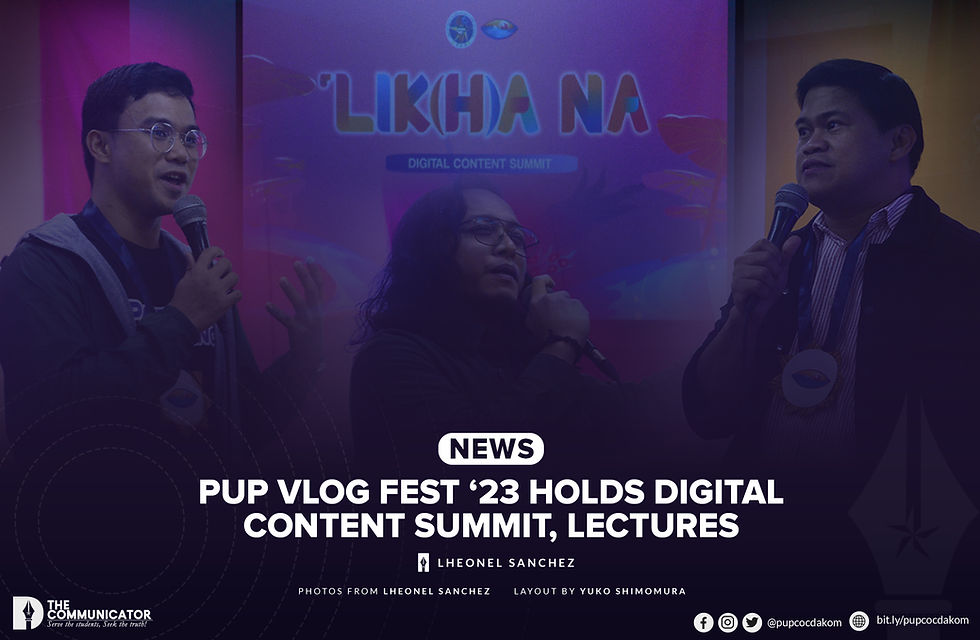NEWS | Various orgs highlight the value of free speech and expression on World Press Freedom Day
- The Communicator
- May 5, 2023
- 3 min read
In commemoration of the 30th World Press Freedom Day, the PUP College of Communication (COC), Southeast Asian Media Studies Association (SEAMSA), The Communicator, and PUP Journalism Guild conducted a webinar that tackled the value of press freedom in democracy and human rights.
The event entitled "Breaking Barriers: Journalists as Catalysts of Freedom of Expression" was held on May 3 via Zoom and Facebook Live.

‘Why do we break these barriers?’
Journalist speakers from various independent media outlets shared the reasons behind breaking these barriers in celebration of World Press Freedom Day with the theme "Shaping a Future of Rights: Freedom of expression as a driver for all other human rights.”
Manny Mogato, a Pulitzer Prize winner and the Editor-at-large of OneNews PH, explained that the biggest problem that journalists are facing today is the loss of credibility and public trust.
“[...] But my biggest fear is not the harassment; that's an intimidation. I considered it part of the job. The biggest problem now is the loss of credibility [and] public trust. [...] The labeling of journalists as biased, dilawan, [and] bayaran that affected credibility,” Mogato stated.
He also mentioned the Reuters Institute survey, which showed that Filipinos consume news and information from social media platforms where misinformation and disinformation are widespread.
In line with this, Archie Bergosa, Explained PH Editor-in-Chief, expounded the shifting narratives happening on social media.
“Social media is very noisy. And there’s this shifting narrative wherein there’s something na tama and there’s something na sinungaling, and then the sad part is—ang laging nananalo ‘yung mali and ‘yung sinungaling. So that’s why sinabi niya na lies spread faster than facts,” Bergosa said.
On the other hand, John Robert de Castro, The Catalyst Editor-in-Chief, presented the current situation of the press and journalistic freedom in the Philippines.
“Kung susuriin, sa pagiging kritikal na paraan ng pagbabalita ang dahilan kung bakit nakararanas at nakakaranas pa ng banta ang mga nabanggit na mamamahayag. Sa patuloy pa na censorship at pamba-block ng website sa mga alternatibong media gaya ng Bulatlat at Pinoy Weekly. Manipestasyon ito ng patuloy na pagkitil ng mga puwersa ng estado sa karapatan sa malayang pamamahayag,” he asserted.
Roundtable discussion
As part of the program, the speakers had a roundtable discussion where they talked about the integral role of the freedom of expression of a journalist in paving demands and campaigns in the community.
Kathyrine X. Cortez, Vice-Chairperson of The National Union of Journalists in the Philippines, pointed out the significance of freedom of information to the freedom of the press.
“Matagal nating sinasabi na iyong freedom of information ay kakambal lagi ‘yan ng freedom of the press, and if we don’t have that democracy, anong mangyayari sa’tin? Paano natin malalaman ‘yung mga simple things and big things lalo na in the government. ‘Yung in general na kailangang malaman ng tao,” she stated.
Moreover, Cortez highlighted the importance of people’s awareness of freedom of the press and the effects of its decline.
“Hindi usapin kung paano natin ito pinaglalaban. Ang importante, lahat dapat ay kinikilala itong importansya ng freedom of information na backbone ng freedom of the press. [...] Diyan mag-uugat lahat ‘yan eh. Kaya kailangan natin at the very least ay maging aware at the same time, although matagal na natin itong ginagawa pero kailangan pa nating palakasin ‘yung unity within our ranks to always defend itong usapin na ito dahil malaki ito. [...] Kapag ito ang nawala, alam na natin kung ano ‘yung magiging epekto,” she added.
In addition, Mogato explained the chilling effect on the media industry after ABS-CBN’s broadcast shutdown.
“Sinara ang ABS-CBN, ang isa sa pinakamalaking broadcast network sa bansa. Ang nangyari ay nagkaroon ng chilling effect. Maraming mga organisasyon ang natakot. Kasi kung nagawa [sa] ABS-CBN, pwedeng magawa sa kanila. So parang nagkaroon ng self-censorship,” he said.
The webinar ended with advice for future journalists to continue their advocacy and fight for the public interest.
Article: Janelle Kayla Liong
Graphics: Aldreich Homillano Pascual









Comments